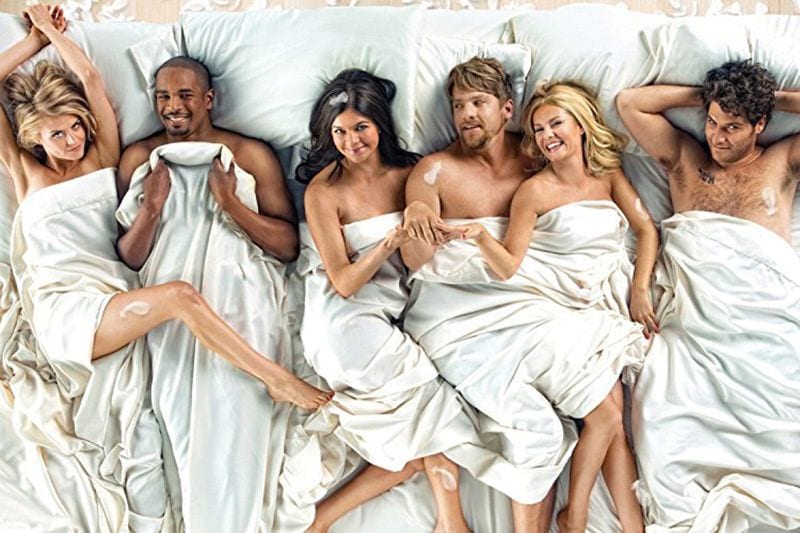
The television landscape is littered with shows that inexplicably never gained the popularity they deserved, and Happy Endings is a perfect example of one of those series. Running for three seasons (2011-2013), and centered on six friends, the series is consistently funny, clever, and exhibits excellent chemistry amongst its cast. While it may have initially seemed that the show was a Friends-like clone, it actually had more in common with 30 Rock’s blink-and-you-miss-them one-liners and another underrated gem, Cougar Town, as they both seemed to get weirder and more hilarious as they went on, even as they remained niche shows.
Though Happy Ending’s original premise focused on Dave (Zachary Knighton) being left at the altar by Alex (Elisha Cuthbert) in front of their families and friends, including Alex’s sister, Jane (Eliza Coupe), Jane’s husband, Brad (Damon Wayans Jr.), and their friends, Penny (Casey Wilson) and Max (Adam Pally), the series quickly establishes the group and their various dynamics as the true center of the series. In fact, Alex and Dave are the least interesting of the bunch in the first season and it’s only when they become as off-the-wall as their friends that the show truly hits its stride.
It would be easy to reduce the characters to clichés: Alex the ditz, Dave the clueless nice guy, Jane the type-A overachiever, Brad the well-groomed dandy, Penny the perpetually single disaster, and Max the slob, yet Happy Endings gleefully upends the formula again and again. Jane and Brad often play opposite gender roles than would traditionally be written for a straight couple and Max is gay without any of the tropes often ascribed to gay male characters on television. In addition, even though these quick characterizations are technically accurate, they only hint at the outlandishness to come.
Happy Endings works brilliantly because the jokes and asides are reminiscent of not only the kinds of inside interactions typical of close friendships, but also because there’s a genuine bond in the group that comes through terrifically. These actors feel like they really could be friends. Much of that is due to the natural chemistry in the cast, but also because of the sharp writing that establishes a believable history based on what the viewer knows now. Max and Penny used to date in college, Alex, Jane, and Penny are friends since childhood, and everyone else pretty much met on an unaired season of The Real World: Sacramento. It’s these kinds of details that veer from the seemingly mundane to the bizarre that make up much of Happy Endings’ sensibility.
In keeping the characters rooted in their relationships with one another, the show is free to go in the eccentric directions that make the series so funny. Whether it’s Max’s obsession with hypothetically marrying famous people with similar last names, overlong new last names (“If Mary Tyler Moore married and then divorced Steven Tyler, then married and divorced Michael Moore, then got into a three-way lesbian marriage with Demi Moore and Mandy Moore, would she go by the name Mary Tyler Moore Tyler Moore Moore Moore?”), or Jane bringing a fully-cooked turkey to Thanksgiving to stealthily switch it with the one already being prepared (“Wrap it in a rug. Throw it in a river.”), or Penny’s absurd attempts to hide a helmet she’s been forced to wear by her doctor (“You can still tell I’m wearing a helmet, can’t you?”), Happy Endings goes to an extreme that works and never seems forced. Much of that can be attributed to the impeccable comic timing of the cast, too.
The cast is uniformly very good (Wayans Jr., in particular, is effortlessly charming throughout), but there are standouts. Wilson plays Penny with equal parts desperation and unfounded confidence (“Relax, this is my specialty. I can spin this… which is why everyone at work calls me the old spinster”) that’s capped off by her pitch-perfect comic timing. Similarly, Pally and Coupe relish their character’s worst traits to excellent comic effect, particularly as they interact with one another, their polar opposites.
Apart from the humor, Happy Endings also succeeds because as the characters became more and more fleshed out, the show gets better. It’s part of what makes its short-lived run so heartbreaking; Happy endings was improving season to season. The core relationships that were at the center when it began started to expand to include pairing and groupings that yielded sometimes unexpected humor, sometimes surprisingly affecting interactions. Again, it’s another example of untapped potential when the show was canceled.
Happy Endings is an ensemble comedy that owes plenty to previous television comedies, but it also manages to carve out its own place in that history. There’s a genuine likability and warmth to the characters and their relationships that allow the humor to flourish in often unanticipated, yet always hilarious ways. Well-written, with unfailingly great comic delivery, Happy Endings is a consistent delight. Even though it’s off the air, now, you can still see it on Blu-ray from Mill Creek Entertainment.
The Complete Series Blu-ray contains featurettes, including behind-the-scenes information and parody interviews, a treasure trove of deleted scenes, and outtakes. They’re a nice addition to the episodes, though cast commentaries would have been a further draw to the set.


![Call for Papers: All Things Reconsidered [MUSIC] May-August 2024](https://www.popmatters.com/wp-content/uploads/2024/04/all-things-reconsidered-call-music-may-2024-720x380.jpg)



